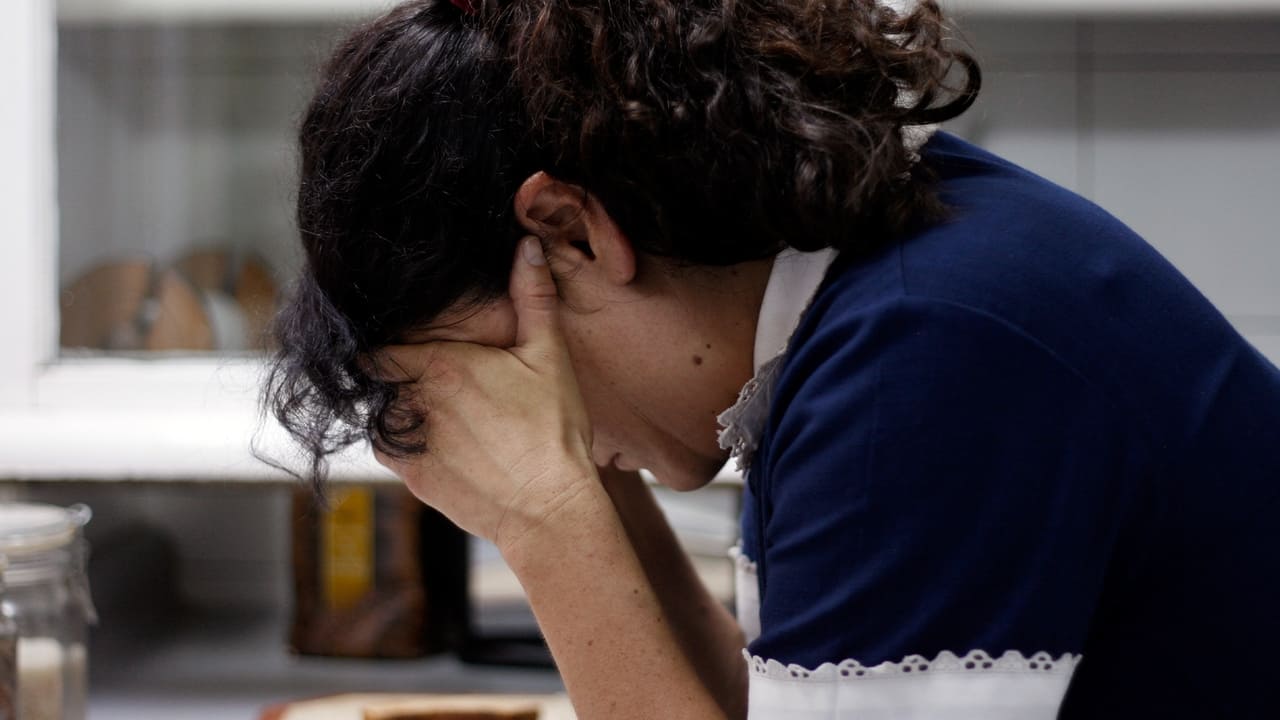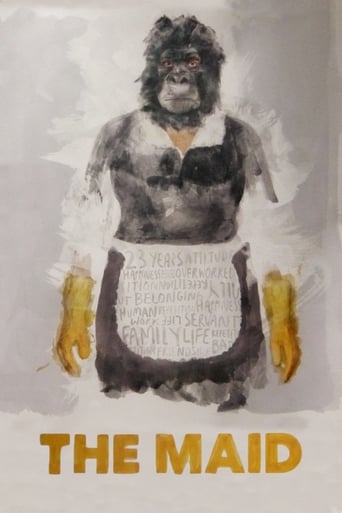Dirtylogy
It's funny, it's tense, it features two great performances from two actors and the director expertly creates a web of odd tension where you actually don't know what is happening for the majority of the run time.
Wyatt
There's no way I can possibly love it entirely but I just think its ridiculously bad, but enjoyable at the same time.
Darin
One of the film's great tricks is that, for a time, you think it will go down a rabbit hole of unrealistic glorification.
Phillipa
Strong acting helps the film overcome an uncertain premise and create characters that hold our attention absolutely.
billcr12
The Maid, or La Nana is a Chilean film that is hard to categorize. Raquel has served an upper class Chilean family for over twenty years, and when she becomes overwhelmed by the demands of the household, they hire another woman to help with the chores. Through a sequence of different pranks, which includes locking the helper out of the house, the assistant quits. It turns out that Raquel is territorial, and possessive of her employers. The next prospect, an older, tougher woman is more difficult to intimidate, but the maid in charge manages to also make life unbearable for her and she gives up and leaves. Raquel believes that she is part of the family because of her many years of living with them and they, in turn, feel obligated to to take care of her. The lead actress, Catalina Saavedra, is a plump, plain looking woman who will alternately make you feel sorry for her at one moment and then want someone to do the right thing and lock up this mentally unstable creature. She is outstanding and had me convinced that she is really nuts. Both funny and sad, The Maid is an excellent movie.
Red-125
La Nana (2009), shown in the U.S. as "The Maid," was written and directed by Sebastián Silva. This film recounts the life, and plight, of a maid in a well-to-do Chilean family. Catalina Saavedra portrays Raquel, who has worked for the same family for 23 years. She lives in their home, and knows their habits, secrets, and idiosyncrasies. The problem is that Raquel has no life outside of the family, and nothing much to show for these years of devoted service. It's true that everyone considers her "one of the family," but she really isn't. When her behavior becomes somewhat erratic, the family has to cope with the problem.To their credit, they don't consider firing Raquel, but their solution is to hire another maid. Raquel perceives this as a threat to her position and identity. Her efforts to force the new maids to leave are treated as comedy, and they are humorous, but beneath the humor is the sad fact that if Raquel loses her central position within the household, she loses her the only thing of value that she has.Catalina Saavedra is outstanding as Raquel. In fact, it would be hard to imagine another actor in the role. You accept her as La Nana, and you have to remind yourself that this is a work of fiction, not a documentary about domestic service in Chile.The film is worth seeking out, although the ending is not really satisfying. Despite the weak ending, it's a movie made with skill and obvious respect for the protagonist. It was shown in the Dryden Theatre, Rochester, as part of the excellent Rochester Labor Film Series. It may be hard to find in a theater, and will work well on a small screen. See it!
Pablo Muller
Impeccable cinema is too often predictable and boring. "The Maid" is far from impeccable. If you are able to excuse not having the best CGI, a team of 20 Hollywood scriptwriters and a big budget, you'll get the chance to experience a movie that comes alive in front of you. In my perspective "The Maid" has been mislabeled as a sociological study. It's just set against this morbid & somehow interesting sociological background of housemaids in Southamerica, but it's much larger than just that. There's a story that develops and characters that are very well defined.Did I mention the acting? Too many times a foreign movie's acting gets good reviews, when it's really a case of finding the foreign ways exotic & attractive, but the acting itself sucks. As a Chilean I can say that this is certainly not the case in "The Maid". Everyone is superb, not just Catalina Saavedra.The American release cuts to 95 minutes, whereas the local one, to 115. I personally think that "Less is More", specially in the Youtube age.
F Gwynplaine MacIntyre
This film's Spanish title "La Nana" has several possible meanings: it could be "The Grandmother" or "The Nanny" ... and the actress in the title role (Catalina Saavedra) was previously best-known for portraying a nanny in a Chilean soap opera. But the plot makes it clear that this film is "The Maid": a character study of Raquel, the live-in housemaid for a Santiago, Chile family. Raquel has been with them for 23 years:since before the younger children's births; now her forty-first birthday forces her to reappraise her life.The family are prosperous, with no explanation for their wealth. Their house has two maids' bedrooms and several family bedrooms; the exterior has a submerged swimming pool and a lush garden (though the gardener only visits weekly). One parent seems to have something to do with a local university, yet we never hear any mention of income nor business. The husband has plenty of time to build elaborate model ships.Raquel's position is awkward: she's "one of the family" when it suits the family's convenience though not otherwise. The family celebrate her birthday with a cake, and the wife announces that Raquel needn't wash the dishes tonight ... but that only means they'll be left for her tomorrow! We're told that Raquel gets a day off each week, but we never learn how she spends this nor how the family get through an entire day without her. If Raquel is receiving any actual wages besides meals and a bed, we never know. Nearly the entire film takes place on this house's grounds, giving us no real view of typical Chilean life.The narrative sets up events but gives them no pay-off. A couple of times, Raquel collapses on the job. Is this merely down to overwork, or an omen of something worse? When the family engage another maid to assist her, Raquel's bizarre behaviour seems to foreshadow mental illness. None of these ideas are developed.Actress Catalina Saavedra is impressive, and well-cast. She's stocky, clearly able to do drudgery, and she has moles on her face and neck. A prettier, more graceful actress would be less plausible in this role, since a prettier woman would possess more career options.I was intrigued at how much U.S. culture was present in this South American film. The characters sing "The Birthday Song" (in Spanish) and one family member performs "I'm Always Chasing Rainbows" on piano. Two characters wear T-shirts depicting, respectively, Disney animals and the New York Giants football team (who are actually based in New Jersey).When I view a non-Anglophone film, I usually concentrate on the dialogue rather than the subtitles, since subtitles are often inaccurate and I want to improve my language skills. I have no trouble understanding Spanish spoken by Spaniards, Mexicans or Puerto Ricans, but I had difficulty following the Chilean accents on this movie's soundtrack. Part of my difficulty was down to bizarre decisions by director Sebastian Silva. "La Nana" has a couple of Robert Altman-style scenes in which several characters speak simultaneously, in rapid-fire Spanish. Oddly, throughout this film Silva stages scenes so that an actor speaks while his or her mouth is off-screen, or with head turned away from the camera, or from a distance, or while photographed through tinted glass, or even speaking while wearing a gorilla mask(!). Silva seems intent on minimising footage in which an actor's mouth needs to synch with the dialogue track. I suspect that there were two reasons for this: to save money on post-dubbing, and to encourage foreign distributors to release this film dubbed into other languages.Speaking of distributors: at several moments in this film, we glimpse female or (more rarely) male nudity that isn't relevant to the plot, and which only seems meant to give this film a better chance at receiving foreign distribution. (Any movie with a few seconds of female breasts qualifies as an "art film".)The entire film is shot with a hand-held camera that moves erratically throughout, and which becomes positively vertiginous in the final scene as Saavedra jogs through Santiago's streets. To keep her in frame and in focus, the camera operator appears to be jogging BACKWARDS directly in front of her, and the camera joggles up and down as if it's getting sea-sick. (The film was shot in 16mm and converted to 35mm.) Elsewhere, director Silva makes some strange camera decisions. When the family's teenage son Lucas (played by director Silva's younger brother) starts performing a magic trick with a handkerchief, I was eager to see the trick itself and also eager to see the boy's level of skill in performing it ... but Silva tilts the camera so that the trick is performed at the very edge of the frame, and we can't see what's happening. Later, when Lucas performs an entire magic show for his family, the camera sets this up but then cuts to an altogether different scene. (The Lucas character seems to be based on director Silva as a teenager.)Unless Chilean Spanish is significantly different from other forms of Spanish in some way I don't know about, the dialogue throughout this film contains some strange word choices. In one sequence, adults keep referring to a cat as "uno gatito" (a kitten) when it's clearly an adult feline. (UPDATE: Some correspondents have informed me that these traits are appropriate for Chilean Spanish.)Normally, when I see impressive work by an actor, director or screenwriter previously unknown to me, I state in my review that I look forward to more work by that person. "La Nana" shows talent and ability on the part of writer/director Silva and actress Saavedra: I'm glad that I've seen this film, and I would happily view more work by either or both of them. However, nothing here engaged me enough to make me want to seek out more of Silva's or Saavedra's work. My rating for "The Maid": 6 out of 10.

